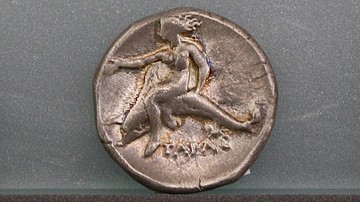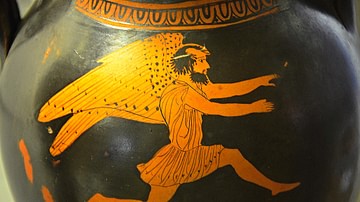Search
Remove Ads
Advertisement
Search Results

Definition
Ancient Egyptian Mythology
Egyptian mythology was the belief structure and underlying form of ancient Egyptian culture from at least c. 4000 BCE (as evidenced by burial practices and tomb paintings) to 30 BCE with the death of Cleopatra VII, the last ruler of the Ptolemaic...

Definition
Mesopotamian Science and Technology
Mesopotamian science and technology developed during the Uruk Period (4100-2900 BCE) and Early Dynastic Period (2900-1750 BCE) of the Sumerian culture of southern Mesopotamia. The foundation of future Mesopotamian advances in scientific/technological...

Definition
Tarentum
Tarentum (Taras, modern Taranto), located on the southern coast of Apulia, Italy, was a Greek and then Roman city. Controlling a large area of Magna Graecia and heading the Italiote League, Tarentum, with its excellent harbour, was a strategically...

Definition
Hyperborea
In Greek mythology, Hyperborea was the land located to the far north of the known world and it was so remote it was considered even beyond the North Wind. There a legendary race known as the Hyperboreans lived and worshipped the sun god Apollo...

Definition
Raphael
Raphael (1483-1520) was an Italian painter and architect who is regarded as one of the greatest of Renaissance artists alongside Michelangelo (1475-1564) and Leonardo da Vinci (1452-1519). Raphael's works are celebrated for their harmonious...

Definition
Science
The term science comes from the Latin word scientia, meaning "knowledge". It can be defined as a systematic attempt to discover, by means of observation and reasoning, particular facts about the world, and to establish laws connecting facts...

Definition
Book of Revelation
The book of Revelation or the Apocalypse of John of Patmos is one of the most famous books in the New Testament. Written near the end of the 1st century CE, it is the only apokalypsis (Greek: "unveiling of unseen realities") that was included...

Definition
Polycrates
Polycrates (r. c. 535-522 BCE) was the tyrant of Samos who established Samian naval supremacy in the eastern Aegean and strove for control of the Aegean Sea and mainland towns of Ionia in the 6th century BCE. Polycrates had a successful career...

Definition
Selinus
Selinus (or Selinous, modern: Selinunte), located on the south-west coast of Sicily, was founded in the mid-7th century BCE by Greek colonists from Megara Hyblaea on the eastern side of the island. Selinus was the most western Greek colony...

Video
The History of Astronomy in the Ancient World
The history of astronomy in the Ancient World can be traced back thousands of years, and well before the Ancient Greek philosophers famously worked on it. It is generally agreed that the discipline of astronomy began in the region of Mesopotamia...